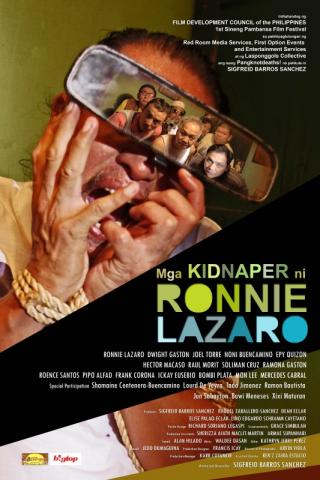Filtered By: Lifestyle
Lifestyle
Movie review: 'Mga Kidnaper ni Ronnie Lazaro'—an indie film within an indie film
BY ALINA R. CO

Poster by Richard Legaspi
How much would it take to make an independent movie?
In the case of this motley crew of filmmakers, they have a working script, a secondhand camera, and not much else.
In the Philippines where most independent filmmakers are the educated elite, these fictional amateurs are comparatively at the bottom of the food chain.
“Walang budget,” a phrase thrown around a lot in both mainstream and independent cinema to mean “low budget,” is an understatement to this bunch. They have no money, no technical know-how, not even connections.
With a few days left before the deadline of submission to the Sineng Pambansa (a real film festival ran by the Film Development Council of the Philippines, where “Mga Kidnaper ni Ronnie Lazaro” was chosen and eventually won the grand prize), desperation leads them to forcibly get the one thing all independent filmmakers want to have—Ronnie Lazaro.
The kidnappers
The movie starts off with one hilarious laugh after another.
Hot-tempered yet huggable, Hector (Hector Macasa) introduces himself as a former stuntman who gains weight after the demise of action films in the country.
Another scene-stealer is when the two “scriptwriters” Jesus look-alike Hesus (Raul Morit) and Muslim vendor of pirated DVDs Abdul (Soliman Cruz) narrate two completely different versions of the plot of their film to Lazaro, who ends up in tears—whether out of frustration or out of laughter.
Morit is a standout comedian, with the natural way he delivers his lines. He might look cuckoo, but as he tells Lazaro, “iba ‘to, matino ‘to.” He is, really.
In fact, the movie invites us not so much to fall for Lazaro, but to have a heart for the kidnappers, whom the director introduces one after another as the narrative moves on.
And like the quintessential “underdog protagonists” in formulaic films, we cheer for the underdogs. When an apartment above them was used as location by a group of well-to-do, English-speaking filmmakers, who look down on them, we grow to love them all the more. Finish your film, make us proud! 

Full circle
Notably, all the actors that played roles and cameos here are all fixtures in independent cinema. A pleasant surprise was inserting interviews with real life independent filmmakers and academics who lament on Lazaro’s kidnapping.
You would think that “Mga Kidnaper,” essentially an indie film within an indie film, will deliver a clear, cohesive statement about the state of Philippine independent cinema.
Besides being a cultural gathering or orgy of sorts, "Mga Kidnaper" may have succeeded in eliciting laughter, poking fun at pretentious, filmmaking posers, and commenting on action movies and their connection to politics, but as the film draws to a close, a viewer wants everything to come in full circle.
Similar to the holes in their dilapidated apartment, the story has its searing gaps.
After the initial delight of getting to know the kidnappers (mostly, their occupations), we find out later there is not much to learn. You’d want to squeeze it out of them, though, as they are interesting characters. But before you know it, the movie has reached its denouement.
And how about the way women were stereotyped in the movie? Let me enumerate the women roles: a prostitute who has no redeeming qualities, a sexy reporter garbed in revealing dresses (played by Mercedes Cabral) and lastly, the girlfriends of the English-speaking crew, who merely acted as decorations in the movie.
The camera as motif is also confusing. Why are they documenting everything, when they are planning to shoot a narrative and supposedly, on a budget? Why waste so many tapes?
You might say, lighten up. “Mga Kidnaper” is a comedy after all, where political correctness is thrown off the gutter.
But save that for sitcoms. Independent cinema is for discourse and all the more, for comedies, it has to be an intelligent one.
How to make the Filipino indie film
In the end, director Sigfried Barros-Sanchez patches things together with Lazaro’s simple yet heartwarming speech, as if to say, “anyone can make a film.”
In contrast to the pretentious filmmakers quoting Zhang Yimou, Quentin Tarantino, and other famous foreign filmmakers, the kidnappers learn a lesson from the most sought-after indie actor himself: Tell stories, as genuinely as you can, regardless of money, time and power. Make it Filipino.
It’s a powerful message that could have been built up from the start or in the middle of the story.
But then again, if the stories referred to are the kidnappers,’ their characters should have been fleshed out first before being developed as symbols of fledgling independent filmmakers. –KG, GMA News
Alina R. Co is a freelance journalist, TV producer and voice-over artist. She is currently finishing her masteral degree at Ateneo de Manila University, solving communication curiosities and dilemmas. The views expressed in this article are solely her own.
More Videos
Most Popular




